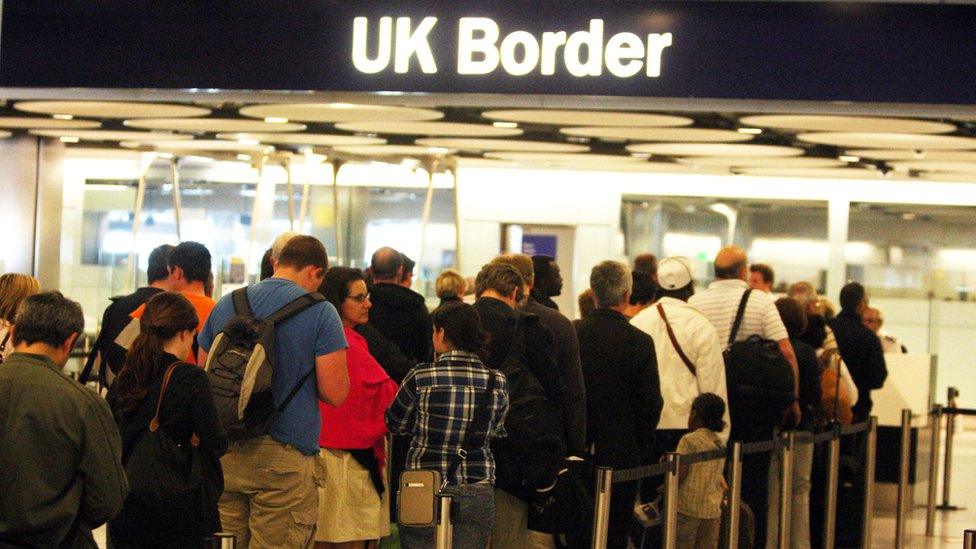MEPs agree Brexit negotiation plan
- Published
- comments

Jean-Claude Juncker addressed MEPs flanked by Brexit negotiator Michel Barnier
The European Parliament has backed a motion setting out its position for the Brexit negotiations by 516 to 133.
Although MEPs will not participate directly in the exit talks they will have to vote in favour of the final deal for it to go ahead.
UKIP's Nigel Farage accused MEPs of trying to impose conditions that were "impossible for Britain to comply with" and likened them to the "mafia".
The motion for debate was supported by the two largest groups of MEPs.
It set out general principles at the start of the two year negotiations for the UK to leave the European Union under the Article 50 process.
At a press conference following the vote, Guy Verhofstadt, the European Parliament's Brexit negotiator, said the vote meant that "the UK on the one hand and the [European] Commission on the other hand now know the position of the Parliament, what the red lines are".
He said "the interests of our citizens is our first priority" and called for an early resolution of the status of EU citizens in the UK and UK citizens elsewhere in Europe.

What are the red lines?
The motion backs a number of positions taken by EU leaders, including the need for a "phased approach" to negotiations.
This would require progress on the terms of Britain's withdrawal, including settling financial commitments, before talks on a future trading relationship can start.
It also backs the call for transparency in the talks, and for the UK to be considered liable for financial commitments that apply after it leaves the EU.
It also says:
transitional arrangements should be time-limited to three years and be enforced by the EU's Court of Justice
UK citizens in the EU and EU citizens in Britain should receive "reciprocal" treatment
the final deal should not include a "trade-off" between trade and security co-operation
the UK should adhere to EU environmental and anti-tax evasion standards to get close trade ties
the European Banking Authority and European Medicines Agency should be moved out of London
the UK should pay towards costs for the EU that "arise directly from its withdrawal"

During the debate in Strasbourg Manfred Weber, chairman of the largest group of MEPs, the centre-right European People's Party, said: "Cherry-picking will not happen. A state outside the European Union will not have better conditions than a state inside the European Union."
Gianni Pitella, chairman of the European Socialists and Democrats also argued that the UK "can not benefit from the same conditions as members do" and added: "If you leave the house, you still have to pay the bills."
The motion is not binding on European Commission officials but President of the European Commission Jean-Claude Juncker told MEPs: "The role of this parliament is more important than ever. You must scrutinise and validate the final agreement."
He added: "We will of course negotiate in friendship and openness and not in a hostile mood, with a country that has brought so much to our union and will remain close to hearts long after they have left, but this is now the time for reason over emotion.
"What's at stake here are the lives of millions of people. Millions have family or professional links to the United Kingdom."
Gibraltar raised
The EU's chief Brexit negotiator, Michel Barnier, warned that "a disunited union could actually lead to there being no deal".
He added: "The 'no deal' scenario is not the scenario we are looking for. We are looking for success, not against the United Kingdom but with the United Kingdom."
Helga Stevens from the Conservatives and Reformists group, which includes MEPs from the UK's ruling Conservative Party, said Brexit "should not be a nasty breakup" and cautioned MEPs against "making excessive demands in advance" of Brexit talks.
"You're behaving like the mafia" - watch highlights of the political sparring in the EU parliament
"If we do anything less, history will judge us harshly as being small and petty," she claimed.
But UKIP MEP Mr Farage argued: "Already you've made a series of demands which are not just unreasonable but in some cases clearly impossible for Britain to comply with."
He accused the EU of seeking to impose a bill of £52bn on the UK and likened this to "a form of ransom demand", adding: "What you could have mentioned is we're actually shareholders in this building and other assets and actually you should be making an offer to us that we can't refuse, to go."
When he accused MEPs of behaving like the mafia, the parliament's Italian president, Antonio Tajani, intervened to object. Mr Farage responded: "I do understand national sensitivities. I'll change it to gangsters."
The former UKIP leader also insisted that Gibraltar should be a "deal breaker" in any negotiations.
Later, Spanish centre-right MEP Esteban Gonzalez Pons accused the UK government of "preventing Scotland staying part of Europe while at the same time they want... Gibraltar to continue to be a tax haven".
At the post-debate press conference, Mr Tajani emphasised the need to uphold the Good Friday Agreement in Northern Ireland and "working for peace".
He also highlighted security co-operation with the UK, saying: "Terrorists know no borders and they do not care about Brexit."
- Published30 December 2020

- Published29 March 2017

- Published21 October 2015
